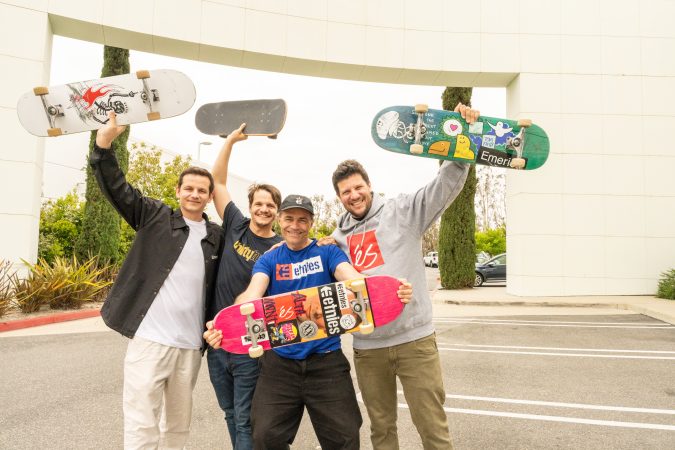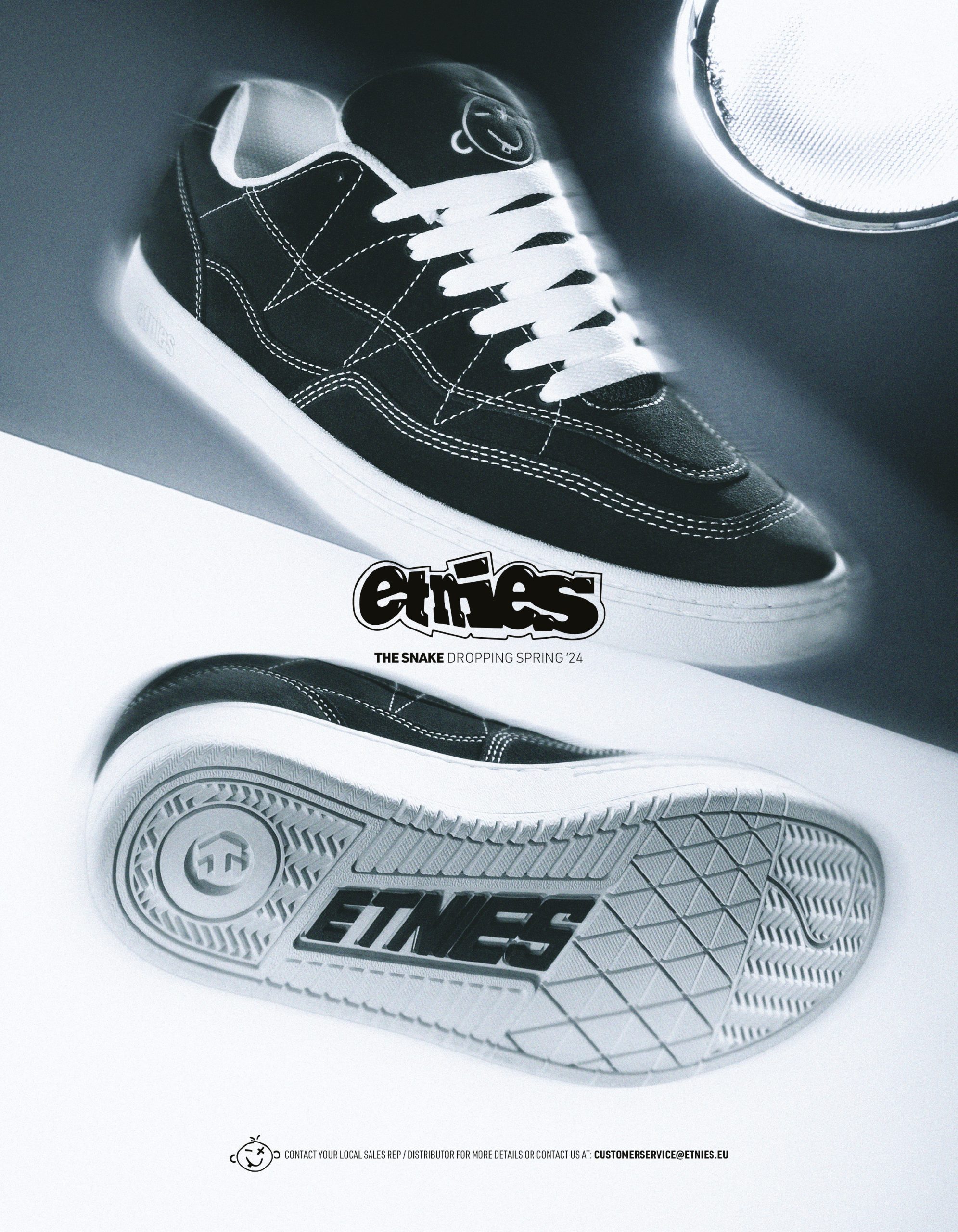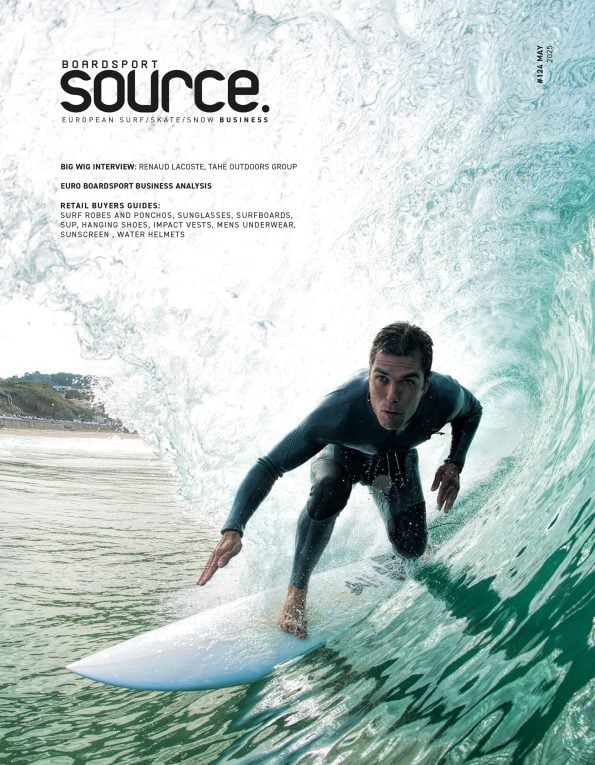
Sole Technology Founder Pierre-André Senizergues On Sale To Nidecker Group
Pierre-André Senizergues has breathed and lived skateboarding since his early teens in France. His life story is one of passion transformed into action. From designing some of the most iconic skate footwear on the market, influencing the sport, to championing environmental commitment in the action sports industry, there is no doubt that he is a doer. As he prepares to pass the baton, he has let his values drive his decision, seeking only likeminded partners. We chat to him about the growth of his company, the transition to the Nidecker group, and his vision for the future.
It’s been a while since we last spoke. Can we have a brief history of your career in skate and Sole Tech to the present day?
Sole Tech history matches Etnies’, which was founded in France in 1986. I had moved to California and started designing for them. I brought the brand to the US in the late 80s. It was a mega struggle for 7 years, but then Etnies took off in 1994. I launched the brands éS, Etnies and Emerica to target different consumers and we had huge growth for 14 years. This was the golden age of the action sports industry; a lot of the brands were owned by riders.
Then, in 2008 the global recession kicked off with a lot of people getting into trouble. Consumer spending became a huge problem and lots of companies were negatively impacted. As a lot of the brands had their headquarters in the U.S., this was really devastating for our industry. A lot of things started changing from there on. As skateboarders and snowboarders, we tried to figure out what to do. At the same time, we were seeing non-endemic footwear brands come into the market, and it became more and more difficult for us. This led us into the COVID era. It started in 2019 in China, so we were already seeing it in our manufacturing. Then, in 2020 it started really impacting the market, giving it a little boost for a little while, as more people were participating in individual sports. This was very good, but for just a short period, because shops bought way too much inventory. So, suddenly it created a huge, massive issue with inventory on the market, lots of discounts everywhere. And then, finally, a major inflation issue followed, which affected the interest rate and consumer spending. So, it’s been pretty crazy from 2008 to today for Sole Technology and all our brands. So, all throughout, me and the team, where trying to figure out what to do. I put every cent I had into those brands, to keep them going, and it came to a point where I could not do that by myself anymore. I realised I needed some partners who could continue this journey with the brands. It’s been very difficult to find the right partner; lots of brands got acquired and became part of a public company or a venture capital company. They grow them and then sell them but for me, it’s always been about the long-term. It’s something that we do because we’re passionate about action sports. That’s where we live and breathe. It’s something that I constantly think about. Where are they going to be? What are the things we want to develop that will really last long-term?
What were you looking for from a new owner? Because I assume you’ve had many approaches in the past by people interested in the business.
Yes I did but it was never right. Many times, I would not even look at the approaches, I wasn’t even interested enough to open a discussion. I wanted to remain as a private company where you have the right values and make the right decisions for the action sport industry. However, when the economic struggle started, I decided I needed to start looking and I realised it’s really hard to find the right fit out there. I always thought that it would have to be something that aligns with the people, the structure, and the values for the long-term. I really needed to find a partner who was in tune with our situation, more like a private company, and with people who would actually ride. I also think somehow, I need to work with younger people that have the same vision that I have for the future of this brand, because eventually they will be driving the brand.
How did you first meet the Nidecker’s? Who approached who?
I got lucky when I met Henry four years ago. He was passing through the U.S., and I met him in L.A. We started talking and he really had great respect for my brands. Actually, Henry and his brothers skated when they were younger, and Xavier even wanted to open a skate shop. So, they’ve always been connected to skateboarding somehow, admiring our brands while being in the snowboard business. They have had a massive influence on snowboarding, and we do a lot of things in ThirtyTwo that are connected to skateboarding. For example, the guys on the ThirtyTwo team actually all skate. I told Henry I needed to do something now because I felt this was the right time. So, about four months ago, we started discussing more intensely about what it could be and how it could be. Eventually, we reached an agreement, and I sold him the brands.
How will the new business be structured?
So, Etnies, éS, Emerica, and ThirtyTwo will all operate under the Nidecker Group. I will be CEO of those four brands, which will continue to be based at their current Lake Forest, California location, while the Sole Tech name will be slowly phased out. We also created a company together that owns the trademark in which the three brothers have a majority share and I have a minority. I also presume ThirtyTwo is going to be more integrated because it’s more snow. So, I’ll still be really involved with those four brands particularly on the marketing, products and sales, whilst Nidecker will run the back-end warehousing, logistics, and finance – all those things I don’t enjoy! My vision has always been the same, the industry has to be in the control of people that ride, live, and breathe action sports. My hope is that this will strengthen Nidecker as a group and will give more hope for people that are launching brands. It’s super important to me that it is led by the right people, it has always been my thing. It’s a big challenge, trying to keep this authenticity.
How did Sole Tech get started?
I started skateboarding in 1977 in Paris, when skateboarding took off like crazy. There were millions of skateboarders in Europe. But then suddenly it just dropped to zero because it was a quick trend, and everybody behind the business was just trying to milk it. So, in the late 70s I tried to rebuild skateboarding in my community in Paris. Then, I went to the US in 1985 and was homeless for six months living in the street. After that, I got sponsored by Sims Skateboard, Tracker Trucks, Vans, Vision Streetwear, Eastpac, and Swatch. I was on the Swatch team with Tony Hawk and Rodney Mullen, Christian Hosoi, Per Wilender and a few others, and I was thinking, what can I do to contribute to our industry? The skate shoes were not made by skateboarders, they were just shoes, and I figured out nobody was really thinking about all those elements skate shoes require. That’s how I started.
What have been the biggest changes in the skate shoe market during your time at Sole Technology?
I remember in the beginning shoes were just piled on the floor. Now shops have a wall of shoes. Eventually, there were about 30 brands of skate shoes in the market. And then, things started changing when the non-endemic brands entered the market. Everyone was resisting, but eventually they broke through, and it changed the game. There are not so many privately-owned skateboard shoes right now, but I really hope the Nidecker brothers can expand, because there’s an opportunity right now. There’s like a huge throwback trend to the nineties and noughties profiles.
What do you see as the big challenges at the moment in the skate footwear market?
As a private company, we’re constantly facing the bigger brands. But I think, in general, one of the big challenges is the inventory in the market. It’s now correcting because footwear brands have been cutting production in Asia over the last two years. So, I know that there is going to be a trend where there’s probably not going to be enough shoes at some point in the future. We are trying to plan with this, and holiday 2024 is looking good.
What are you most proud about at Sole Tech?
Definitely, the people in my team. And anybody that has been involved in the industry and tried to figure out how to do it right, for our culture and our community. We care about everyone, including the environment as we need a planet to ride on. So, in 2000 I made a resolution that Sole Tech would become carbon neutral by 2020. We achieved it by 2015. We’ve been a carbon neutral company since then. We started planting forests 13 years ago and have planted over 2 million trees. Now, we are planting trees to create shade and cover to grow food in Africa, and we give shoes to the homeless in LA. I feel the Nidecker team has a similar ethos and will make long-term solutions to benefit us all. That’s what it about. Contributing to thecommunity and giving them something to enjoy. And, that’s what I’m proud of — that we gave skateboarders, snowboarders and all of action sports superior product that will continue transforming their love for riding and sharing.







